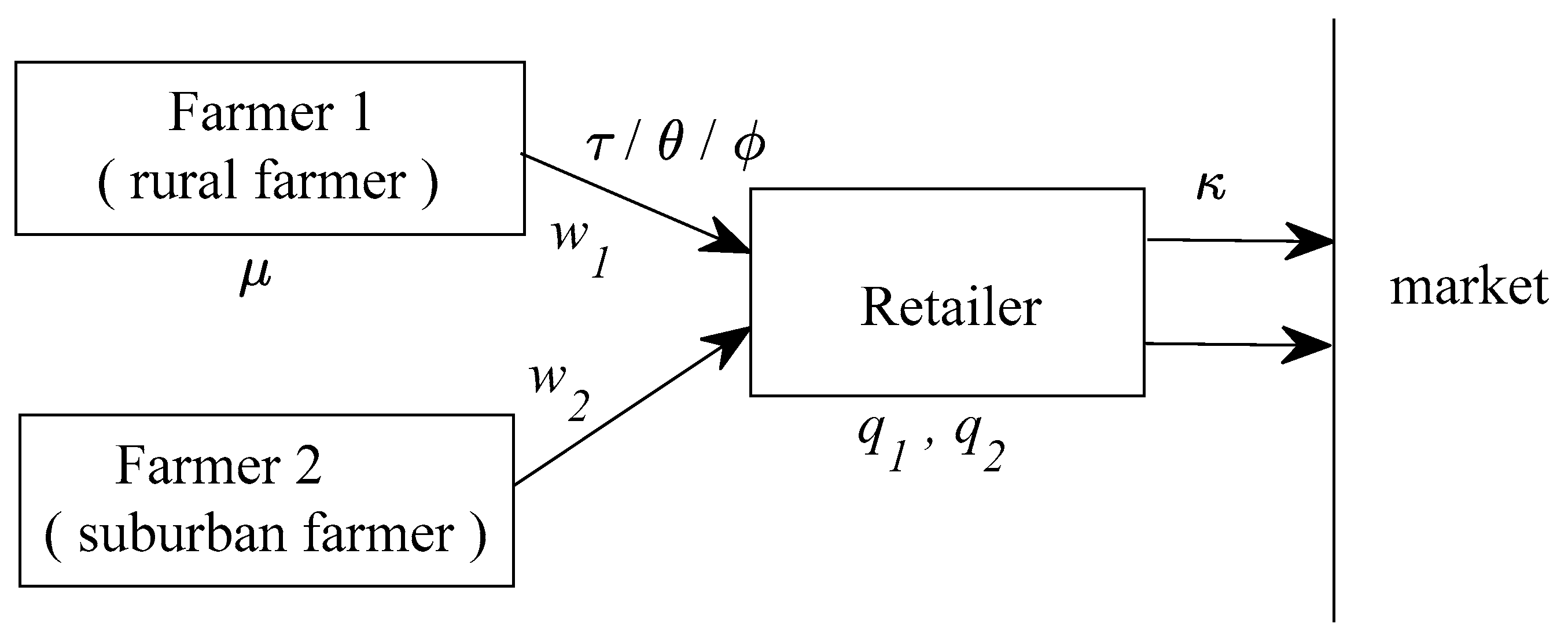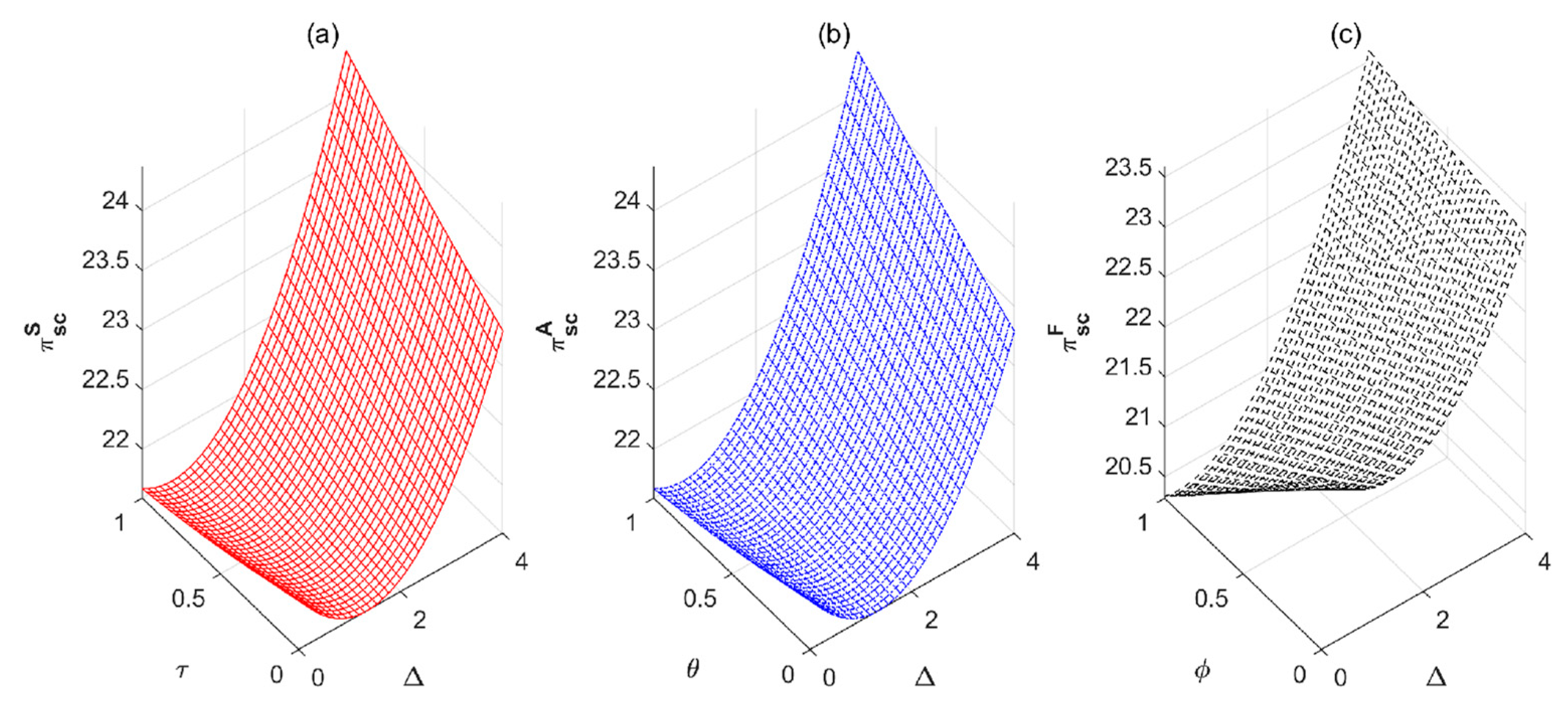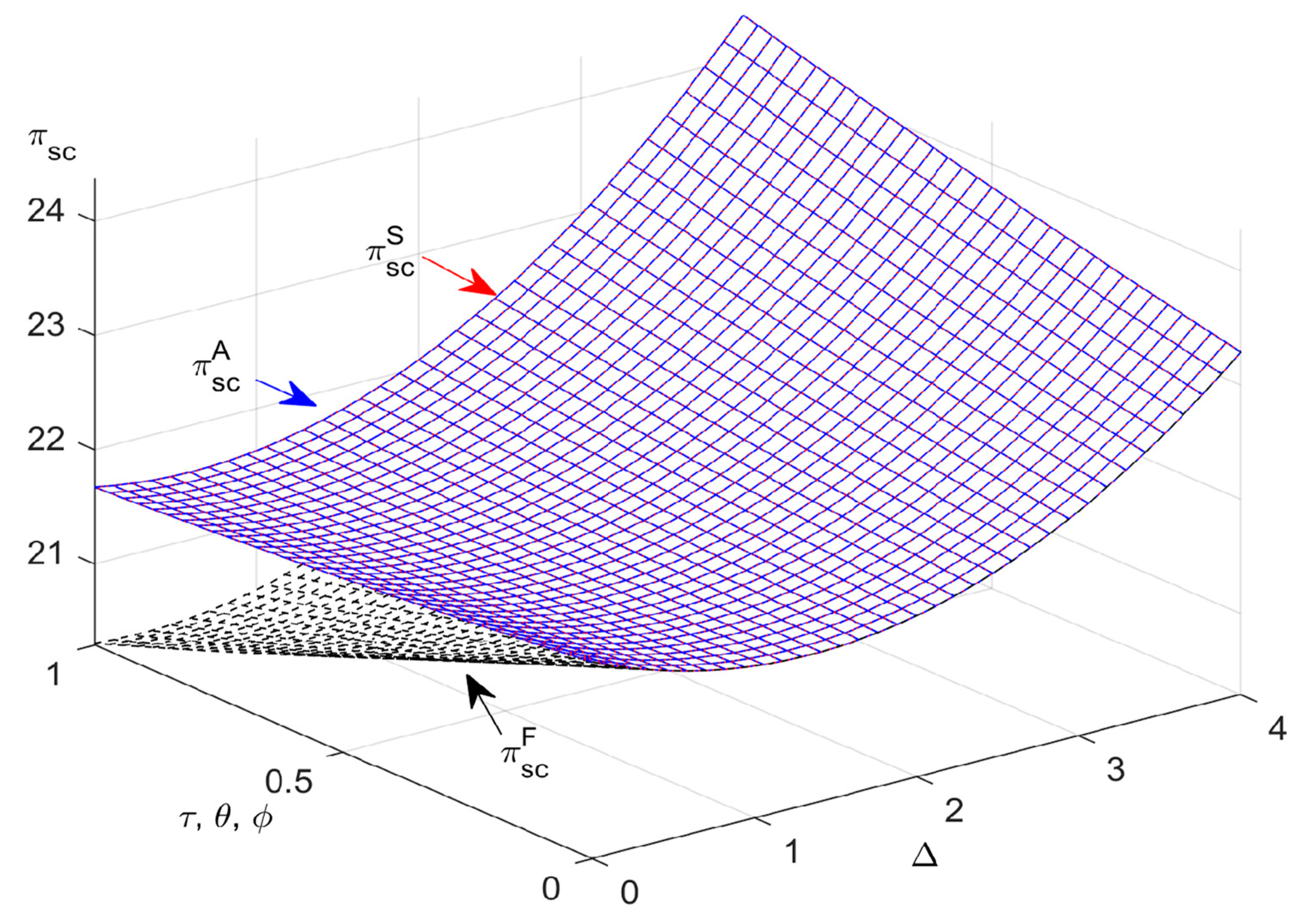Implications of CSR Practices for a Development Supply Chain in Alleviating Farmers’ Poverty
Abstract
1. Introduction
2. Literature Review
2.1. Development Supply Chain
2.2. CSR Practices in Supply Chains
3. Model Assumptions
4. Model Analysis
4.1. Model N: The Base Model
4.2. Model S: Model with a Cost-Sharing Retailer
4.3. Model A: Model with an Altruistic Preference Retailer
4.4. Model F: Model with a Fair-Minded Retailer
5. Comparison of Four Models
6. Numerical Analysis
7. Conclusions
Author Contributions
Funding
Data Availability Statement
Acknowledgments
Conflicts of Interest
Appendix A
References
- An, J.; Cho, S.-H.; Tang, C.S. Aggregating Smallholder Farmers in Emerging Economies. Prod. Oper. Manag. 2015, 24, 1414–1429. [Google Scholar] [CrossRef]
- Zasada, I. Multifunctional Peri-Urban Agriculture—A Review of Societal Demands and the Provision of Goods and Services by Farming. Land Use Policy 2011, 28, 639–648. [Google Scholar] [CrossRef]
- Orsini, F.; Kahane, R.; Nono-Womdim, R.; Gianquinto, G. Urban agriculture in the developing world: A review. Agron. Sustain. Dev. 2013, 33, 695–720. [Google Scholar] [CrossRef]
- Kao, T.-Y.; Chen, J.C.H.; Wu, J.-T.B.; Yang, M.-H. Poverty Reduction through Empowerment for Sustainable Development: A Proactive Strategy of Corporate Social Responsibility. Corp. Soc. Responsib. Environ. Manag. 2016, 23, 140–149. [Google Scholar] [CrossRef]
- Yonghui. 2019 Corporate Social Responsibility Report of Yonghui Superstores. 2020. Available online: http://www.yonghui.com.cn/upload/Inv/6190375.PDF (accessed on 2 April 2020).
- English.gov.cn. China to Promote Poverty Alleviation through Consumption. 2019. Available online: http://english.www.gov.cn/policies/latest_releases/2019/01/14/content_281476479024726.htm (accessed on 14 January 2019).
- En.people.cn. Sales of China’s Anti-Poverty Products Exceed 330 Billion Yuan in First 10 Months. 2020. Available online: http://english.www.gov.cn/news/topnews/202011/29/content_WS5fc38b93c6d0f72576940db9.html (accessed on 29 November 2020).
- Yu, J.J.; Tang, C.S.; Sodhi, M.S.; Knuckles, J. Optimal Subsidies for Development Supply Chains. Manuf. Serv. Oper. Manag. 2020, 22, 1131–1147. [Google Scholar] [CrossRef]
- Sodhi, M.S.; Tang, C.S. Supply-Chain Research Opportunities with the Poor as Suppliers or Distributors in Developing Countries. Prod. Oper. Manag. 2014, 23, 1483–1494. [Google Scholar] [CrossRef]
- ChinaDaily. China’s Poverty Reduction Offers Lessons for Africa. 2020. Available online: http://www.chinadaily.com.cn/a/202012/29/WS5fea88a5a31024ad0ba9f2bf.html (accessed on 29 December 2020).
- Edmond Yeboah, N.; Feng, Y.; Oppong-Sekyere, D.; Boadi Nyamaah, J. Agricultural Supply Chain Risk Identification—A Case Finding from Ghana. J. Manag. Strategy 2014, 5, 31–48. [Google Scholar] [CrossRef]
- Wang, H.H.; Wang, Y.; Delgado, M.S. The Transition to Modern Agriculture: Contract Farming in Developing Economies. Am. J. Agric. Econ. 2014, 96, 1257–1271. [Google Scholar] [CrossRef]
- Fang, L.; Huang, C.-C. Targeted poverty alleviation in China: Evidence from Jingdong e-commerce poverty alleviation. Poverty Public Policy 2020, 12, 386–396. [Google Scholar] [CrossRef]
- Kolk, A.; van Tulder, R. Poverty alleviation as business strategy? Evaluating commitments of frontrunner Multinational Corporations. World Dev. 2006, 34, 789–801. [Google Scholar] [CrossRef]
- Zhou, J.; Fan, X.; Chen, Y.-J.; Tang, C.S. Information Provision and Farmer Welfare in Developing Economies. Manuf. Serv. Oper. Manag. 2020, 23, 230–245. [Google Scholar] [CrossRef]
- Chen, Y.-J.; JGeorge, S.; Zuo-Jun Max, S. Training, Production, and Channel Separation in ITC’s E-Choupal Network. Prod. Oper. Manag. 2013, 22, 348–364. [Google Scholar] [CrossRef]
- Yu, J.J.; Tang, C.S.; Shen, Z.-J.M. Improving Consumer Welfare and Manufacturer Profit via Government Subsidy Programs: Subsidizing Consumers or Manufacturers? Manuf. Serv. Oper. Manag. 2018, 20, 752–766. [Google Scholar] [CrossRef]
- Tang, C.S.; Sodhi, M.S.; Formentini, M. An analysis of partially-guaranteed-price contracts between farmers and agri-food companies. Eur. J. Oper. Res. 2016, 254, 1063–1073. [Google Scholar] [CrossRef]
- García-Martínez, G.; Guijarro, F.; Poyatos, J.A. Measuring the social responsibility of European companies: A goal programming approach. Int. Trans. Oper. Res. 2019, 26, 1074–1095. [Google Scholar] [CrossRef]
- Zhou, Y.-W.; Guo, J.; Zhou, W. Pricing/service strategies for a dual-channel supply chain with free riding and service-cost sharing. Int. J. Prod. Econ. 2018, 196, 198–210. [Google Scholar] [CrossRef]
- Xie, J.; Zhang, W.; Liang, L.; Xia, Y.; Yin, J.; Yang, G. The revenue and cost sharing contract of pricing and servicing policies in a dual-channel closed-loop supply chain. J. Clean. Prod. 2018, 191, 361–383. [Google Scholar] [CrossRef]
- Li, T.; Zhang, R.; Zhao, S.; Liu, B. Low carbon strategy analysis under revenue-sharing and cost-sharing contracts. J. Clean. Prod. 2019, 212, 1462–1477. [Google Scholar] [CrossRef]
- Hosseini-Motlagh, S.-M.; Pazari, P.; Nouri, M. Coordination of promotional effort, corporate social responsibility and periodic review replenishment decisions in a two-echelon socially responsible supply chain. J. Ind. Syst. Eng. 2018, 11, 60–83. [Google Scholar]
- Wang, Y.; Fan, R.; Shen, L.; Miller, W. Recycling decisions of low-carbon e-commerce closed-loop supply chain under government subsidy mechanism and altruistic preference. J. Clean. Prod. 2020, 259, 120883. [Google Scholar] [CrossRef]
- Wan, X.; Jiang, B.; Li, Q.; Hou, X. Dual-channel environmental hotel supply chain network equilibrium decision under altruism preference and demand uncertainty. J. Clean. Prod. 2020, 271, 122595. [Google Scholar] [CrossRef]
- Xu, F.; Wang, H. Competitive–Cooperative Strategy Based on Altruistic Behavior for Dual-Channel Supply Chains. Sustainability 2018, 10, 2103. [Google Scholar] [CrossRef]
- Wang, Y.; Yu, Z.; Shen, L.; Dong, W. E-Commerce Supply Chain Models under Altruistic Preference. Mathematics 2021, 9, 632. [Google Scholar] [CrossRef]
- Wang, Y.; Yu, Z.; Shen, L.; Fan, R.; Tang, R. Decisions and Coordination in E-Commerce Supply Chain under Logistics Outsourcing and Altruistic Preferences. Mathematics 2021, 9, 253. [Google Scholar] [CrossRef]
- Guan, Z.; Ye, T.; Yin, R. Channel coordination under Nash bargaining fairness concerns in differential games of goodwill accumulation. Eur. J. Oper. Res. 2020, 285, 916–930. [Google Scholar] [CrossRef]
- Caliskan-Demirag, O.; Chen, Y.F.; Li, J. Channel coordination under fairness concerns and nonlinear demand. Eur. J. Oper. Res. 2010, 207, 1321–1326. [Google Scholar] [CrossRef]
- Cui, T.H.; Raju, J.S.; Zhang, Z.J. Fairness and Channel Coordination. Manag. Sci. 2007, 53, 1303–1314. [Google Scholar] [CrossRef]
- Yang, J.; Xie, J.; Deng, X.; Xiong, H. Cooperative advertising in a distribution channel with fairness concerns. Eur. J. Oper. Res. 2013, 227, 401–407. [Google Scholar] [CrossRef]
- Zheng, X.-X.; Liu, Z.; Li, K.W.; Huang, J.; Chen, J. Cooperative game approaches to coordinating a three-echelon closed-loop supply chain with fairness concerns. Int. J. Prod. Econ. 2019, 212, 92–110. [Google Scholar] [CrossRef]
- Zhou, Y.; Bao, M.; Chen, X.; Xu, X. Co-op advertising and emission reduction cost sharing contracts and coordination in low-carbon supply chain based on fairness concerns. J. Clean. Prod. 2016, 133, 402–413. [Google Scholar] [CrossRef]
- Shen, L.; Lin, F.; Wang, Y.; Su, X.; Li, H.; Zhou, R. Advertising Decisions of Platform Supply Chains Considering Network Externalities and Fairness Concerns. Mathematics 2022, 10, 2359. [Google Scholar] [CrossRef]
- Arslan, M.C.; Turkay, M. EOQ Revisited with Sustainability Considerations. Found. Comput. Decis. Sci. 2013, 38, 223–249. [Google Scholar] [CrossRef]
- Modak, N.M.; Kazemi, N.; Cárdenas-Barrón, L.E. Investigating structure of a two-echelon closed-loop supply chain using social work donation as a Corporate Social Responsibility practice. Int. J. Prod. Econ. 2019, 207, 19–33. [Google Scholar] [CrossRef]
- Liu, Y.; Liu, Z.; Ren, W.; Lin Forrest, J.Y. A coordination mechanism through relational contract in a two-echelon supply chain. J. Retail. Consum. Serv. 2020, 56, 102156. [Google Scholar] [CrossRef]
- Sodhi, M.S.; Tang, C.S. Buttressing Supply Chains against Floods in Asia for Humanitarian Relief and Economic Recovery. Prod. Oper. Manag. 2014, 23, 938–950. [Google Scholar] [CrossRef]
- Wu, C.-H. Collaboration and sharing mechanisms in improving corporate social responsibility. Cent. Eur. J. Oper. Res. 2016, 24, 681–707. [Google Scholar] [CrossRef]
- Tang, C.S.; Wang, Y.; Zhao, M. The Implications of Utilizing Market Information and Adopting Agricultural Advice for Farmers in Developing Economies. Prod. Oper. Manag. 2015, 24, 1197–1215. [Google Scholar] [CrossRef]
- Puggioni, D.; Stefanou, S.E. The value of being socially responsible: A primal-dual approach. Eur. J. Oper. Res. 2019, 276, 1090–1103. [Google Scholar] [CrossRef]
- Xia, Y.; Zu, X.; Shi, C. A profit-driven approach to building a “people-responsible” supply chain. Eur. J. Oper. Res. 2015, 241, 348–360. [Google Scholar] [CrossRef]
- Yuen, K.F.; Thai, V.V.; Wong, Y.D. Are customers willing to pay for corporate social responsibility? A study of individual-specific mediators. Total Qual. Manag. Bus. Excell. 2016, 27, 912–926. [Google Scholar] [CrossRef]
- Singh, N.; Vives, X. Price and quantity competition in a differentiated duopoly. Rand J. Econ. 1984, 15, 546–554. [Google Scholar] [CrossRef]
- Wang, Y.; Niu, B.; Guo, P. On the Advantage of Quantity Leadership When Outsourcing Production to a Competitive Contract Manufacturer. Prod. Oper. Manag. 2013, 22, 104–119. [Google Scholar] [CrossRef]
- Jiang, X.; Zhou, J. The Impact of Rebate Distribution on Fairness Concerns in Supply Chains. Mathematics 2021, 9, 778. [Google Scholar] [CrossRef]
- Fehr, E.; Schmidt, K.M. A theory of fairness, competition, and cooperation. Q. J. Econ. 1999, 114, 817–868. [Google Scholar] [CrossRef]





| Poor Farmer | Supply Chain | Cost-Sharing Practice | Altruistic Preference Practice | Fairness Concern Practice | Competition | Game Theory | |
|---|---|---|---|---|---|---|---|
| Sodhi & Tang [9] | √ | √ | |||||
| Sodhi & Tang [39] | √ | √ | |||||
| Zhou et al. [15] | √ | √ | √ | ||||
| Chen et al. [16] | √ | √ | √ | ||||
| Zhou et al. [20] | √ | √ | √ | √ | |||
| Xie et al. [21] | √ | √ | √ | ||||
| Wu [40] | √ | √ | √ | ||||
| Yu et al. [17] | √ | √ | √ | ||||
| Wang et al. [24] | √ | √ | √ | ||||
| Wan et al. [25] | √ | √ | √ | √ | |||
| Xu & Wang [26] | √ | √ | √ | ||||
| Guan et al. [29] | √ | √ | √ | ||||
| Zheng et al. [33] | √ | √ | √ | √ | |||
| Zhou et al. [34] | √ | √ | √ | ||||
| This paper | √ | √ | √ | √ | √ | √ | √ |
| CSR Practices | Explanation |
|---|---|
| Cost-sharing practice | Due to technical and infrastructure disadvantages, the rural farmer pays more than the suburban farmer to grow the same agricultural products. As a CSR practice, the CSR-conscious retailer shares the rural farmer’s cost, but not the suburban farmer’s. |
| Altruistic preference practice | The CSR-conscious retailer has altruistic behavior toward the rural farmer but not the suburban farmer. |
| Fairness concern practice | Typically, the retailer will order more products from the suburban farmer due to the cost advantage. As a fairness concerns practice, the CSR-conscious retailer tries to order a similar amount from both farmers. |
| Notation | Definition |
|---|---|
| Market potential of farmers’ products | |
| The quantities sensitivity parameter of two products | |
| The competition intensity of two farmers’ products | |
| The elasticity of market price with regard to CSR performance | |
| The cost difference between two farmers’ products | |
| The degree of retailer’s cost-sharing practice | |
| The degree of retailer’s altruistic preference practice | |
| The degree of retailer’s fairness concern practice | |
| Market prices of the two products | |
| The wholesale price of two products (farmers’ decision variable) | |
| The order quantities of two products (retailer’s decision variable) | |
| Profit of two farmers | |
| Profit of the retailer | |
| Profit of the supply chain |
Publisher’s Note: MDPI stays neutral with regard to jurisdictional claims in published maps and institutional affiliations. |
© 2022 by the authors. Licensee MDPI, Basel, Switzerland. This article is an open access article distributed under the terms and conditions of the Creative Commons Attribution (CC BY) license (https://creativecommons.org/licenses/by/4.0/).
Share and Cite
Zhang, Q.; Luo, T. Implications of CSR Practices for a Development Supply Chain in Alleviating Farmers’ Poverty. Mathematics 2022, 10, 3762. https://doi.org/10.3390/math10203762
Zhang Q, Luo T. Implications of CSR Practices for a Development Supply Chain in Alleviating Farmers’ Poverty. Mathematics. 2022; 10(20):3762. https://doi.org/10.3390/math10203762
Chicago/Turabian StyleZhang, Qingyu, and Tianlong Luo. 2022. "Implications of CSR Practices for a Development Supply Chain in Alleviating Farmers’ Poverty" Mathematics 10, no. 20: 3762. https://doi.org/10.3390/math10203762
APA StyleZhang, Q., & Luo, T. (2022). Implications of CSR Practices for a Development Supply Chain in Alleviating Farmers’ Poverty. Mathematics, 10(20), 3762. https://doi.org/10.3390/math10203762





